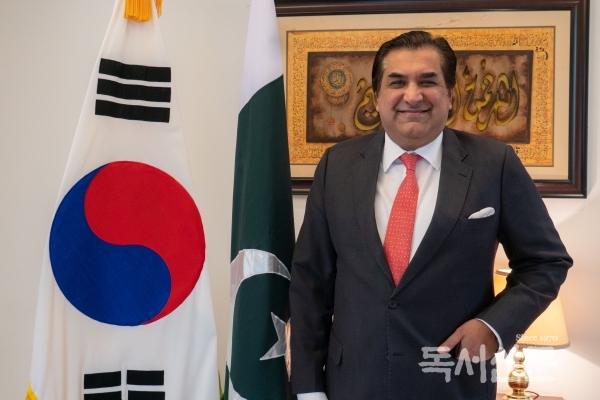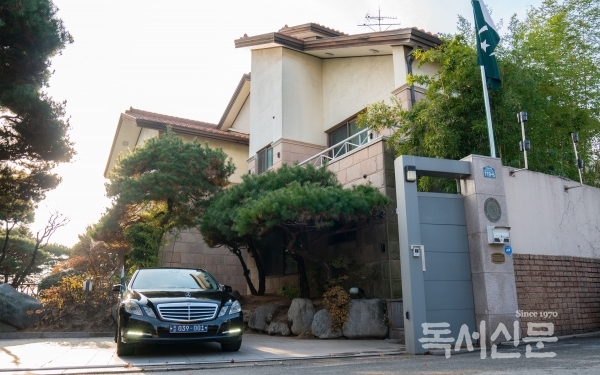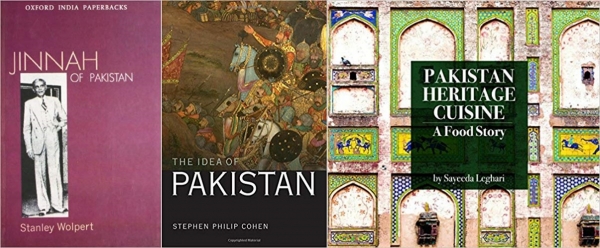※ 라힘 하얏트 쿠레쉬 주한 파키스탄 대사 인터뷰 기사의 영문 버전입니다. 국문 버전은 기사 하단 링크를 클릭해주세요.
| The ambassador directly and indirectly supports bilateral cultural exchanges as well as diplomatic negotiations in the countries dispatched based on authority granted by the head of state. The ambassador's words are regarded as the most reliable source of information about the country because the ambassador in the host country has the same symbolism. As part of the 'Reading Korea' campaign, the Reading Newspaper have prepared a time to learn about each country's culture and arts through foreign ambassadors stationed in Korea. <Editor's Note> |

[Readersnews Seo mit-eum] Pakistan sits in southwestern Asia and borders China, India, Afghanistan and Iran. Its official name is 'Islamic Republic of Pakistan' and about 96% of its people are Muslim. The capital city of Islamabad means 'the city of Islam.' Pakistan is the fifth most populous country in the world (28.8 million as of 2017) and 96 percent of them are Muslim (which means Muslims).
The 1991 breakup of the former Soviet Union created a number of new countries in Central Asia named 'national name plus stan'. so it is easy to think of Pakistan as a similar case, But in fact Pakistan lies in South Asia and the whole continent was under the control of British Empire from which it got independence on 14th August 1947. Chaudhry Rehmat ali, Pakistan’s independence activist, coined the name Pakistan, representing different Muslim majority areas i.e. Punjab, Afghan/Pakhtuns, Kashmir, Sindh and Baluchistan.
Pakistan is also known as a nuclear power with powerful nuclear weapons. Pakistan developed nuclear weapons as a countermeasure after India’s nuclear tests in 1974. Pakistan has fought 4 wars with India on the issue of Kashmir, which is a longstanding internationally-recognized disputed territory between the two countries. Recently, with the Indian unilateral actions of 5th August 2019 of scrapping Article 370 and 35-A of Indian constitutions which granted special autonomy to the area, tensions between the two countries flared. International community has condemned the human rights violations taking place in Indian Occupied Jammu and Kashmir (IOJ&K), which is evident from various international media and international human rights organizations reports.
Consular relations between Pakistan and Korea were established in 1968 however they were upgraded to diplomatic relations in 1980. Both countries have enjoyed friendly and cordial relations however due to the imposition of travel advisory on Pakistan by Korean government, Korean tourists feel reluctant to visit Pakistan. But with the recent successful visit of the Head of Jogye Order and his delegation to Pakistan we hope that Korean government will consider revising its position on Pakistan because of a stable and secure environment in Pakistan. Pakistani Ambassador to South Korea Rahim Hayat Kuresh, who took office two years ago and is shaping a new path, faced him at his residence in Itaewon. He began a conversation with the sweetness of traditional Pakistani food 'Gulab Jaman' (food sprinkled with syrup on fried milk balls) and 'Carrot Halva' (sugar confection).

Q. You have been selected as an interviewee of <Reading Books: Listening from the Ambassadors> column. Please give your thoughts and greetings to readers of the <Reading News>.
A. It is an honour to be selected as an interviewee of Reader News’ Listening to Ambassadors column. It would help the readers of this newspaper to have a better understanding of Pakistan and its culture and customs. I also hope that this interview will dispel some of the misunderstandings that people have about Pakistan and would be more than willing to visit Pakistan.
Q. It has been two years since you came to Korea as the Ambassador of Pakistan. Please tell us about outstanding similarities and differences between Korea (Korean) and Pakistan (Pakistani).
A. My experience here in Korea has been wonderful so far. I was lucky enough to be offered Seoul as the first Ambassadorial assignment as South Korea is a very important country in all aspects be it economic, cultural, political or otherwise. I chose Korea for my posting as I was previously offered various stations in Europe which I declined and rather preferred to come to Korea because of its unique culture and historical linkages with Pakistan.
Historically speaking, Pakistan and Korea are connected to each other for the last 1635 years since 384 A.D. when Monk Maranantha brought Buddhism to the ancient kingdom of Baekje from Swabi in Pakistan, travelling across China and arriving at BopSeongpo in Yong-gwang province in the Baekjae Kingdom as mentioned in the Korean Historical texts of “Samguk Yusa’ by Iryeon (1281), “Samgul Sagi” by Kim Busik (1145) and “Haedong Goseungjeon” by Gakhun (1215).
In terms of family values, there are many outstanding similarities between Pakistan and Korea where parents and elders are given utmost respect and treated with dignity. In order to give respect to elders, specific words are added in the normal language which is also a part of Pakistani culture.

Q. What are the main fields that Korea and Pakistan are actively engaged in? What other exchanges do you hope to have?
A. Pakistan and Korea have strong and cordial relations in all fields including political, economic, social and cultural. In economic terms, we have a trade of around $1.34 billion plus we receive development assistance to the tune of US$ 500 million.
In addition, there is a community of around 12,500 Pakistanis among whom around 2500 are students who are pursuing their Masters and Ph.Ds. in STEM subjects. They are doing an excellent job in all fields from AI to cancer research to nanotechnology.
The interaction between the people of both countries has increased tremendously in the past few years. Many Korean investors are increasingly taking interest in Pakistani market. On daily basis, visas are issued to 15-20 Koreans who are either undertaking business trip or visiting Pakistan for tourism purpose. People to people contacts are expected to grow further with the recent successful visit of Head of Jogye Order along with the delegation of 80 monks to Pakistan from 16th – 24th November, 2019. It will open new doors of Buddhist tourism from Korea to Pakistan.

Q. Unfortunately, most parts of Pakistan are ‘travel-restricted’ zones designated by the Korean Ministry of Foreign Affairs. It is not easy to travel to Pakistan, so what is the situation these days?
A. It is said that “We can choose our friends but not our neighbors”, so is the case with Pakistan which has hostile neighbors on the east and west. On the east lies India with which 3 major wars have been fought in the past on the issue of Kashmir. Pakistan has friendly relations with all countries around the world. However Pakistan ties with India are strained because of Kashmir issue which is an internationally recognized dispute. The recent actions of India in the Indian Occupied Jammu and Kashmir (IOJ&K) have created unrest in the region and its implications are not just for the region but for the whole world.
Main source of terrorism in Pakistan was Afghanistan due to Soviet invasion in 1979 and subsequent War on Terror by US in Afghanistan in 2001. It resulted in migration of terrorist groups from Afghanistan into Pakistan that led to instability. However, Pakistan armed forces initiated several cleanup operations to root out the safe havens of terrorist groups. Now normalcy has returned to Pakistan due to the massive efforts and sacrifices of the Government of Pakistan and its armed forces. Travelers from around the world have visited Pakistan and made documentaries on secure and stable situation in Pakistan. Recently the delegation of around 80 Buddhist monks, headed by the President of Jogye Order, visited Pakistan for 1 week and went to the northern areas, Khyber Pakhtunkhwa province, Lahore and Islamabad. They travelled the length and breadth of Pakistan without coming across any insecurity which is a testimony to the safe and secure environment in Pakistan.
Q. Is there a travel destination that ambassador personally recommend? Why?
A. Pakistan is a land of diversity where travellers can experience the historical heritage of one of the oldest civilisations in the world, worship at the rich collection of Sufi shrines, Hindu temples, Sikh gurdawaras and Buddhist monasteries, scale some of the highest mountains in the world, or simply experience natural beauty ranging from blossoming trees against a backdrop of snow-clad peaks in Gilgit-Baltistan to pristine beaches in Gwadar.
Pakistan is home to the highest mountain ranges in the world with 5 out of 14 highest independent peaks that are commonly called as eight-thousanders and around 108 peaks above 7000 metres. K-2, the 2nd highest mountain in the world, is also located in Pakistan.
For exciting historical architecture experience, it is recommended to visit old Lahore which is not only famous for its architecture but also exquisite Pakistani cuisine which tourists enjoy a lot. For Buddhist attractions, Peshawar, Mardan and Takht-i-Bahi are of considerable value as they were once the centre of Gandhara Civilization.
Q. Still, there are some people visiting Pakistan. Is there anything cultural to be careful about when visiting Pakistan?
A. People of Pakistan are very hospitable and friendly where guests, tourists and visitors, whether domestic or international, are always welcomed with open arms. Cultural and religious beliefs encourage Pakistanis to show love and respect towards guests.
While travelling in Pakistan, tourists should however make sure that while entering in mosques they cover themselves properly and for women they must wear a scarf. Also if tourists learn to say Asalamo Alaikum (Peace be upon you) and shukrya meherbani (Thank You) then people will respect them a lot and will be more enthusiastic to help them.
Q. Society's certain interests are bound to be reflected in bestsellers. What is the popular book in Pakistan these days? Why?
A. The book “Pakistan: A hard country” by Anatol Lieven is amongst one of the most popular books in Pakistan. This book is lucid and well informed, the author deals carefully with all Pakistan’s well-known problems while avoiding the hysteria and partial judgment that disfigures much contemporary writing on the subject. The comprehensive research work has taken into account almost everybody who counts including farmers, intelligence officers, judges, clerics, politicians, doctors and soldiers. This book has overturned many prejudices, and gives general readers plenty of fresh concepts with which to think about a routinely misrepresented country.

Q. I would like to know about Pakistani food and food culture.
A. Due to historical, geographical and ethnic diversity, Pakistan’s culture is a melting pot of Persian, Afghan, Central Asian, South Asian and Western Asian influences. Similarly Pakistani cuisine has developed over many years and incorporates elements from its neighbours. The varied regions also means there are a wide range of different foods – from the fertile valleys and the sea of Sindh province; to pastoral Baluchistan from neighbouring Iran; to the Punjab with its five rivers and the rugged North West Frontier.
The blend of South Asian, Far Eastern and Middle Eastern cooking techniques creates a distinctive mix of complex flavours. Pakistan is generally regarded as a bread culture, with meals being eaten with the right hand and naan bread or roti used to scoop up curries and accompaniments as is the practice in Muslim culture.
Sweets are abundant, using generous amounts of ghee, sugar and nuts such as pistachios and almonds. Halva (meaning sweet) is one of the most popular sweets and can be made with flour or semolina but can also be made with carrot or pumpkin. Many sweets are also infused with fragrant essences like rosewater.
Q. Do you have any favorite Korean food? Is there any Korean something that the Ambassador wants to bring and introduce to Pakistan?
A. In terms of food, Kimchi is one of my favorites and is also quite similar to a dish in Pakistan called as “Achar” which is made of variety of fruits and vegetables including mangos, green chillies, carrots and others. This is another similarity which shows how culturally connected two countries are.
The best thing about Korean food is that it is simpler, lighter and healthier, the benefits of which are reflected in the health and fitness of Korean people. Another unique aspect of Korean cuisine is the complimentary side dishes that are offered in huge variety and for free.

Q. On the contrary, what do you want to bring or introduce from Pakistan to Korea?
A. I would like to introduce Pakistani handicrafts in Korea. They are specifically popular for its enthralling embellishment, magnetizing hues and attractive textures. Strikingly, the making of handicrafts is ethnic as different areas of Pakistan own their individual heritage and their style is abstract in its particular manner. Artisans in our country have done wonders in this field. They are genius in this skill whether it includes weaving, designing, embroidery or printing.
The tradition of creating handicrafts is thousand-year old. It is considered as a Pakistani custom that is noticed since ancient times of Harappa, Mohen Jo Daro and Indus Valley civilizations.

Q. Please introduce about three books which would be helpful for understanding Pakistan or the book that you read impressively.
A. It is said that books are our best companions. Books are a good source of learning about diverse cultures of various regions in the world. There are numerous books written on history and culture of Pakistan however there are few as mentioned below that can make the reader fully understand about Pakistan, its history and modern evolution.
『Jinnah of Pakistan』 By Stanley Wolpert is another book that is worth reading. The author has described the creator of Pakistan, Muhammad Ali Jinnah as “Few individuals significantly alter the course of history. Fewer still modify the map of the world. Hardly anyone can be credited with creating a nation-state. Muhammad Ali Jinnah did all three.”
Wolpert in this book has shown how Jinnah’s shrewd and skillful leadership combined brilliant advocacy and singular tenacity to win his suit for the creation of Pakistan on behalf of the ‘Muslim nation’—his sole client during the last, lonely, pain-filled decade of his life. Up until this point, Jinnah’s depiction was quite misrepresented in most of the written works. Stanley Wolpert presents a balanced and objective view of this towering figure of the modern world politics.
『The Idea of Pakistan』 By Stephen Philip Cohen counters the popular argument that is usually placed about “Pakistan being a failed state, which is about to collapse” and presents an alternate view point. The author touches upon various facets including foreign policy, the role of army, the role of Islam, economy, etc. Stephen Cohen also presents some possible scenarios about the future of Pakistan.
『Pakistan Heritage Cuisine: A food story』 By Sayeeda tells about Pakistani food and cooking. In this book, the author has tried to give readers an insight into the incredible journey of Pakistani cuisine, its grandeur as well as its simplicity, its finesse as well as its ruggedness and the historical influences that have shaped it. It also reveals the evolution and history of Pakistani foods, while describing food like biryani. It is one of the best books in order to understand Pakistani food and cooks across the globe.


